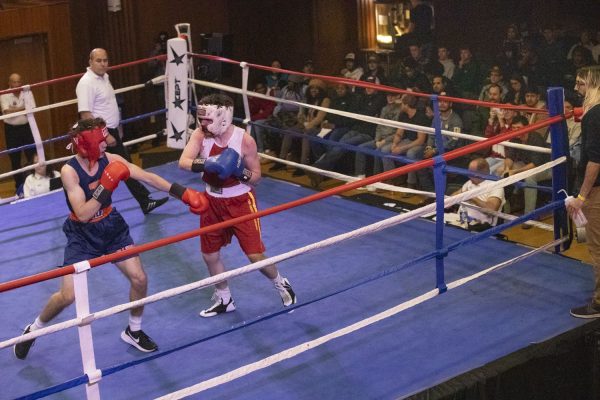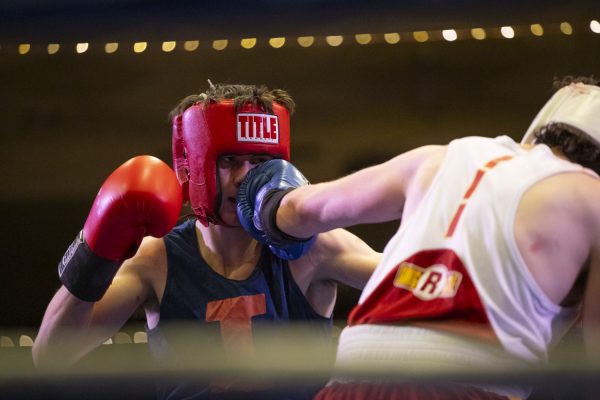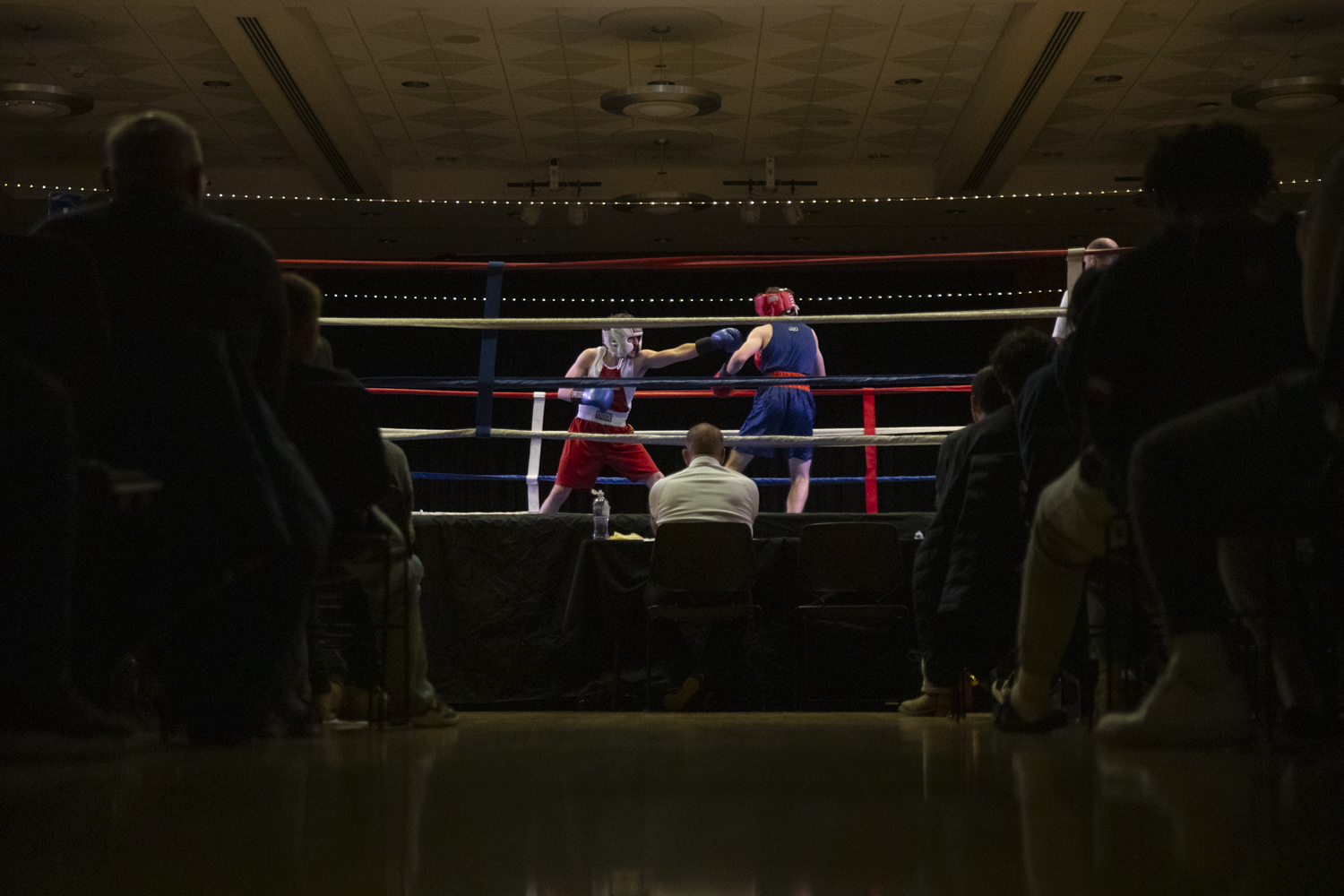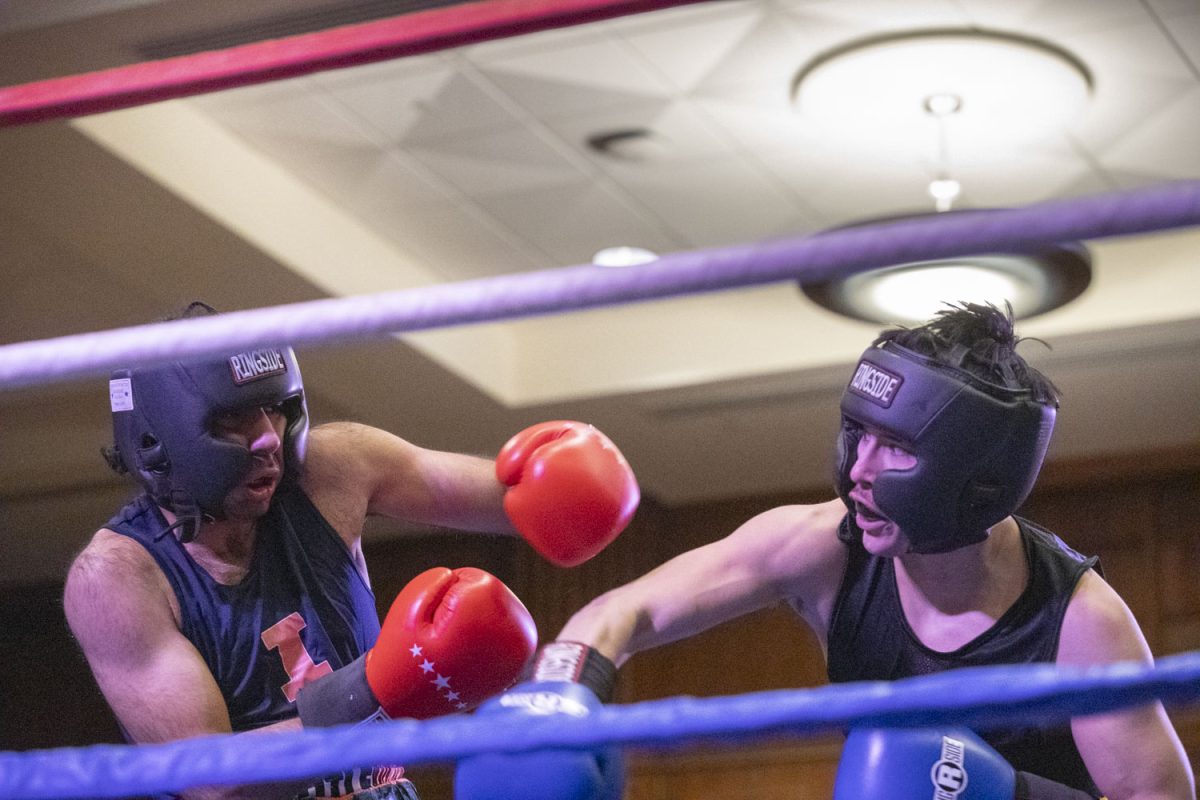Gloves were up, and adrenaline was high at the Iowa Memorial Union on Saturday night as the University of Iowa Boxing Club hosted its fifth annual Fall Brawl event, drawing a crowd eager for a night of grit and glory in the ring.
For Michael Conefrey, a fourth-year political science major and vice president of the Iowa Boxing Club, the Fall Brawl is a familiar stage.
“It’s my fourth time fighting at the show. I know what to expect. So just letting the young guns know what to expect as well,” Conefrey said before the event. “It’s my favorite fight we do, so I’m amped but calm.”
Max Borkowicz, a third-year business management student, fought in last year’s show and served as the announcer this year.
“We do the best show in college boxing,” Borkowicz said. “We’ve got a great production crew, better than most people put on.”
A boxing ring was set up in the IMU ballroom, and the event began at 4 p.m. featuring matchups between UI boxers and opponents from Iowa State University and other colleges.
The crowd was lively with music playing and lights illuminating the space.
Eleven fights were held throughout the night. The final fight was between 176-pound Valjot Boyal and Michael Conefrey in the Elite Male Division, where Boyal succeeded in defeating Conefrey, winning Fall Brawl.

As it was a sanctioned event, officials from USA Boxing were also present, with Chief of Officials Jeannie Joiner expressing her excitement.
“Officials enjoy coming to their show,” Joiner said, referring to the Iowa Boxing Club. “It’s like a big boxing family with officials, coaches, boxers, and doctors.”
George Chamberlain, a coach for Iowa Boxing Club and owner of Big George’s Boxing Club, said he hopes to instill in the club’s 35 members a sense of resilience that will serve them beyond the ring.
“I always like to say that there’s two kinds of people in life as in the ring,” Chamberlain said. “There’s a hitter, and there’s a hit-ee. Of those two, who is it you want to be?”
Chamberlain encourages the boxers he trains to adopt the mentality of a hitter, both in the ring when facing opponents and outside of it, urging them to actively pursue their dreams and goals with the same determination.
Alexandra Loren, a UI neuroscience graduate and trained Jiu-Jitsu fighter, assists the Iowa Boxing Club with marketing, advertising, and occasionally offers support as a certified paramedic.Loren said adopting a “hitter” mentality has served her in various aspects of her life.
“You have to be the hitter, so you have to be willing to take that initiative,” Loren said. “It’s a lot easier to get chewed out by a co-worker when you’re used to fighting 300-pound men. It really puts things into perspective.”
Chamberlain’s coaching philosophy also prioritizes the boxers’ safety.
As a USA Boxing-sanctioned event, the Fall Brawl adhered to strict protocols, including pre and post-bout medical examinations, the presence of certified officials, and compliance with USA Boxing’s comprehensive safety regulations.
“Safety is definitely the number one concern,” Chamberlain said. “Everything that we do is to make sure that the kids do really well.”

Chamberlain also emphasized that boxing is less dangerous than people often think, noting it doesn’t rank among the top 25 sports for injuries per capita among amateur athletes, according to the Centers for Disease Control and Prevention.
“You have to be in really good physical shape to compete, and you’re competing against one other individual who is directly right in front of you,” Chamberlain said of the overall safety of boxing. “It’s really hard, if you’re in good shape, to get hurt because you should be able to protect yourself.”
Loren said outdated stereotypes of boxing have led the UI’s risk management team to raise concerns about the Fall Brawl in past years.
She noted that serious injuries at boxing events on other campuses typically occur in unsanctioned matches, which lack the rigorous safety standards required for sanctioned events.
“The university came after us and was like, ‘We need to know more about what safety measures you’re going to provide here at the show,’” Loren said. “But USA Boxing actually has very strict regulations.”
Loren highlighted that sanctioned matches require boxers to undergo medical exams before and after the match, with a ringside doctor and officials present to intervene if necessary.
“The referee can end the fight at any time, the medic can end the fight at any time, the coach can end the fight at any time,” Loren said. “A lot of safeguards are in place.”




